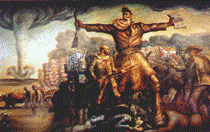History, Department of

James A. Rawley Graduate Conference in the Humanities
Date of this Version
April 2008
Document Type
Article
Abstract
The historical community is undergoing change. Computers, digital tools, the Web, and online resource repositories have created a revolution in teaching, research, scholarship, outreach, and thought. How the digital age impacts history remains a looming concern. This paper will explore the digital age and the serious myriad questions facing the historical community now and in the future. With unfettered access to countless historical resources via online archives and databases, the Web provides an exceptional space for historians to research, discover teaching aides, and develop new thought. Fluid in content and form, the dynamic digital media changes the way we teach, research, and interpret history. Although skepticism currently exists within the historical profession, digital historical scholarship has a unique ability to connect with broader, more diverse audiences. Even with the great and rapid access to digitized documents students and professionals now enjoy, investment in the future to maintain the historical record and provide access to future history remains crucial. Preserving born-digital records represents a tremendous concern as archives and archivists do not have practical methods to maintain those records, raising the probability of losing contemporary documents. Indeed, digital information and the creation of electronic records are rapidly revolutionizing archival work and storing digital information, but there is more at stake for professionals in the humanities and particularly historians. Preserving born-digital records will determine future research and what topics historians can investigate. Important evidentiary pieces, like e-mail and memoranda, created digitally may not survive. There remains a continuing uncertainty about the future of digital information and history, one that if not considered will have a detrimental impact on future teaching, research, scholarship, knowledge, and memory.


Comments
Paper presented at the 3rd Annual James A. Rawley Conference in the Humanities — Imagining Communities: People, Places, Meanings. Lincoln, Nebraska, April 12, 2008. Sponsored by the University of Nebraska–Lincoln History Graduate Students’ Association. Copyright © 2008 Brent Rogers.